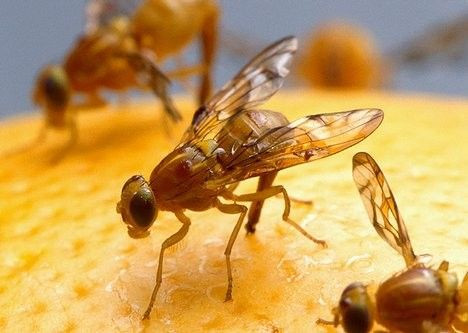Fruit Flies Use Booze to Self-Medicate

Fruit flies seek out alcohol when infected by parasites in an attempt to self-medicate, researchers concluded. Fruit flies escape a certain-death from parasite infection by drinking so much alcohol their blood becomes toxic to parasites.
Some parasites, like wasps, use venom to suppress fly larvae immune systems and deposit eggs into the fledgling flies. Eventually, the parasites will eat their way out of the fly and kill the host. Researchers found that infected fruit flies seek out rotting fruit that contains alcohol to purge the parasite.
They're essentially living in booze, Dr. Todd Schlenke, lead researcher and assistant professor of biology at Emory University, told EurekAlert.
Fruit flies get their alcohol from fermented fruit; a fermented banana can contain more alcohol than a bottle of beer, according to the research authors.
The amount of alcohol in their natural habitat can range from 5 to 15 percent, Schlenke said. Imagine if everything that you ate and drank all day long was 5 percent alcohol. We wouldn't be able to live like that, but fruit flies are really good at detoxifying alcohol.
Fruit flies can handle booze thanks to alcohol-degrading enzymes, but the wasps are lightweights. A developing wasp exposed to alcohol ends up with its organs expelled from the body in a way researchers said they have never seen before.
The strength of the result was surprising, Schlenke told EurekAlert. The infected fruit flies really do seem to purposely consume alcohol, and the alcohol consumption correlates to much higher survival rates.
This self-medication is the latest move in an evolutionary chess match between fruit flies and wasps.
A constant co-evolutionary battle is going on between the immune systems of the flies and the venoms of the wasps, the authors wrote. Any new mechanism of defense that protects flies from wasps will tend to spread through fly populations by natural selection.
Wasps are already adapting and becoming alcohol resistant. One alcohol-resistant wasp species that infects fruit flies died in 10 percent of cases when exposed to alcohol compared to most other wasps that had a 65 percent mortality rate.
You would expect this kind of result since the generalist wasp species can attack plenty of other flies, but the specialist wasps are under strong pressure to adapt to the alcohol-infused habitat of [the fruit fly], Schlenke told PhysOrg.
While the researchers plan to explore the concept of whether alcohol could help kill parasites in humans, Schlenke told The New York Times that people shouldn't open the liquor cabinet when they don't feel well.
As far as I can tell, no one's ever tested whether we humans can make life hard for our blood-borne pathogens by getting our blood alcohol levels up, he said.
Fruit flies aren't the only animals that self-medicate. Observers have seen chimpanzees eat plants with anti-diarrheal and de-worming properties when sick, according to Discovery News. Goats infected with worms also self-medicate by eating plants with anti-parasitic properties.
The journal Current Biology published the study on Thursday.
© Copyright IBTimes 2025. All rights reserved.





















